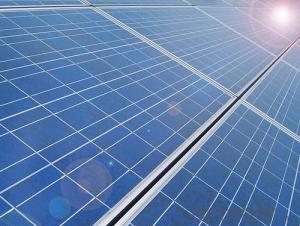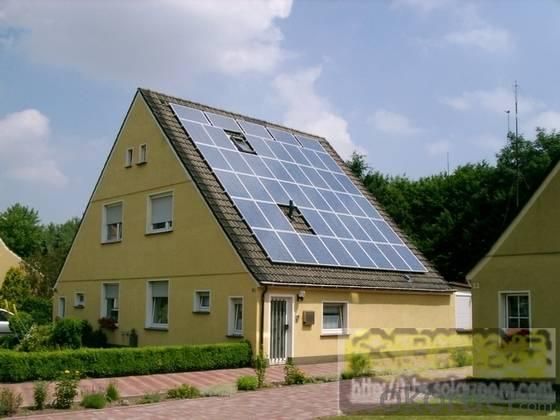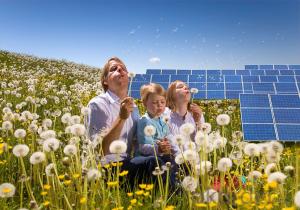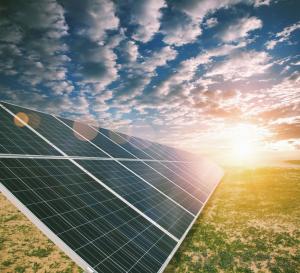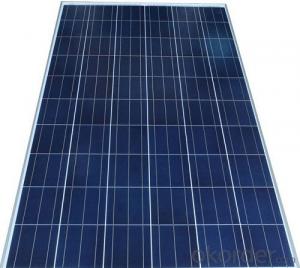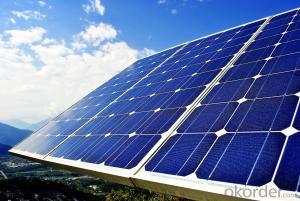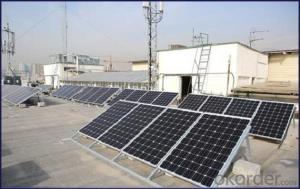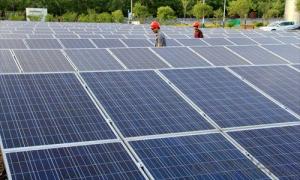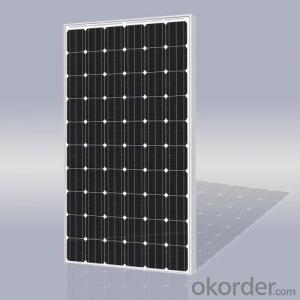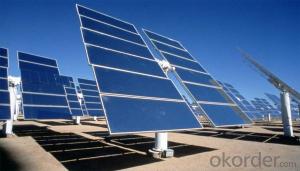CE and TUV Approved 145W Poly Solar Panel - Solar Panels Pittsburgh PA
- Loading Port:
- Shanghai
- Payment Terms:
- TT OR LC
- Min Order Qty:
- 10000 watt
- Supply Capability:
- 20000000 watt/month
OKorder Service Pledge
OKorder Financial Service
You Might Also Like
Specification
1. The Introduction of Solar Module
Solar modules use light energy from the sun to generate electricity through the photovoltaic effect. The majority of modules use wafer-based crystalline silicon cells or thin-film cells based on cadmium telluride or silicon. The structural (load carrying) member of a module can either be the top layer or the back layer. Cells must also be protected from mechanical damage and moisture. Most solar modules are rigid, but semi-flexible ones are available, based on thin-film cells.
2.Technical Parameter
Type | CNBM Solar Polycrystalline Series |
Materials | Silicon |
Guarantee | 12 yrs free from defects in materials and workmanship No less than 90% within 10yrs and no less than 80% within 25yrs TUV(IEC61215&IEC61730), CE, UL |
Application | Photovoltaic/ solar/ green energy/ energy saving |
Descriptions | 1.High efficiency crystalline silicon solar cell. Even if under the weak light, the solar module can produce maximum power output. 2.Tempered glass (toughened glass): Anti-reflecting coating and high transmission rate glass increase the power output and mechanical strength of solar module. 3. EVA and TPT: Using high quality EVA and TPT to prevent destroying and water. 4. AI frame: Without screw, rner connection. 6 holes on the frame can be installed easily. 5. Junction box: Multi function junction box with water proof. 6. Long lifetime: ≥25 years; Less power decrease. 7. Good performance of preventing from atrocious weather such as wind and hails. 8. Resisting moisture and etching effectively, not effected by geology. 9. The certificate issued by international authority: UL, TUV, IEC, CE.
|
Packaging Details: | 26pcs/pallet, 28pallets/ 40HQ Our solar panels are packed in cartons, and then pallet. Shipping by sea or by air are both ok, it up to customer’s chose. We’d like to inquiry the freight cost for customer after be informed exact quantity and destination address. |
3. Application and Pictures of Products
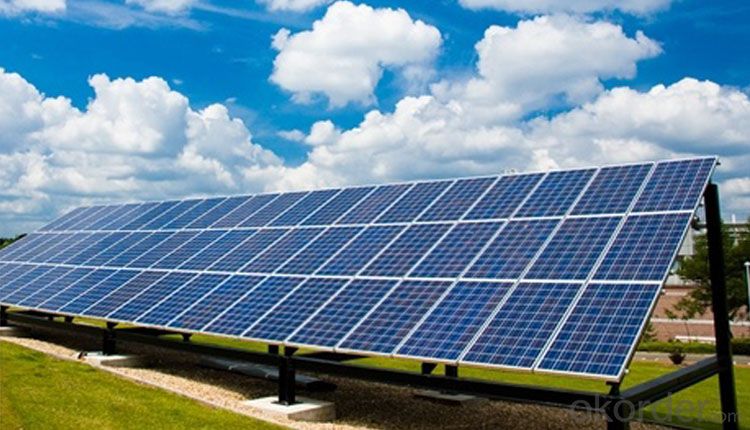
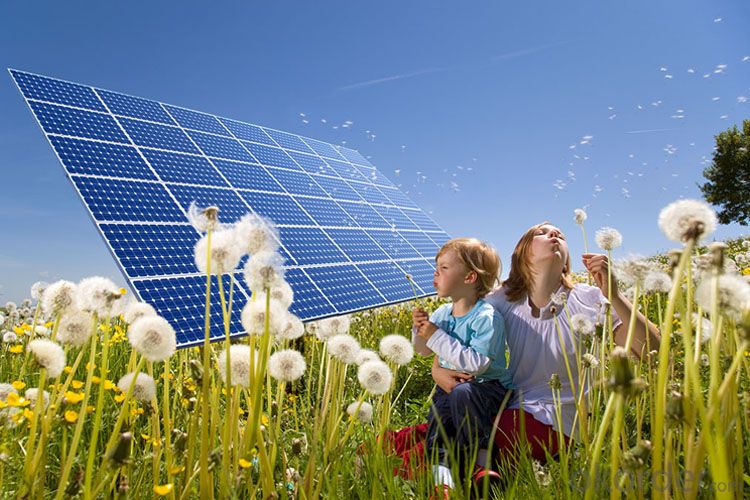
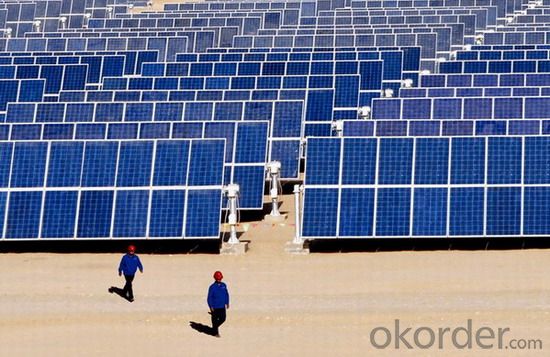
4. How to Work
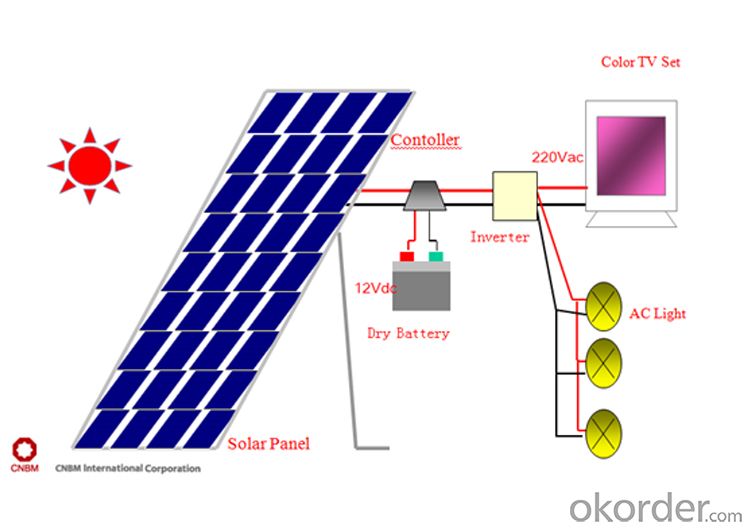
5. Packing Details
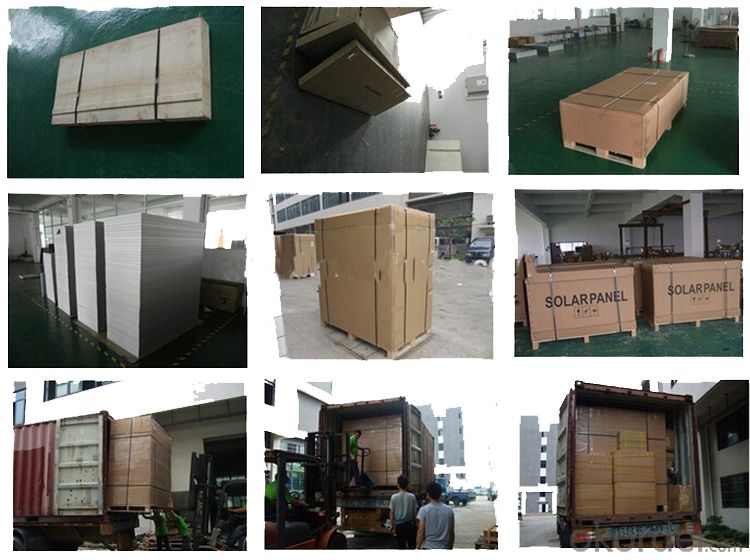
6. FAQ
Q1: What is the business type for the company?
A1: We are one of the biggest manufacturers in zhejiang.Chnia. Which is a high tech PV enterprise dedicated to the research, development, production and sales..
Q2: How long solar panel warranty can you offer?
A2: 10-Year product warranty,25-year linear power output warranty
If there is any quality problem, we will pay for freight and send free parts to you.
Q3: How many certificates do you have?
A3: We have 16 certificates,such as CE, TUV, UL, and so on.
- Q: Can solar panels be installed on a pergola or shade structure?
- Yes, solar panels can be installed on a pergola or shade structure. In fact, installing solar panels on a pergola or shade structure can provide both shade and renewable energy generation, making it a practical and efficient solution for maximizing space and reducing energy costs.
- Q: Please, I want a good definition. :DD
- Solar panels are used to gather solar energy from the sun. Solar panels help maintain a clean and sustainable environment; using solar panels to gather the sunlight is a type of renewable energy. After collecting sunlight, the panels convert the energy into electricity
- Q: How do solar panels affect the overall energy consumption of a building?
- Solar panels can significantly reduce the overall energy consumption of a building. By harnessing the sun's energy and converting it into electricity, solar panels provide a clean and renewable source of power. This reduces the reliance on traditional fossil fuel-based electricity, leading to lower energy bills and a reduced carbon footprint. Additionally, excess energy generated by the solar panels can be stored or fed back into the grid, further offsetting the building's energy consumption.
- Q: I would like to know if I had a mobile kitchen could I power it from solar panels mounted atop the vehicle (truck).(to power electric kitchen equipment, i.e. stove, deep fryer.), instead of propane…could I possibly connect the solar panels to a battery to save my generated electricity? If solar panels would not be enough power could a small windmill suffice…?
- Nice enough idea you have there, but practical reality is waiting to bring you back to your senses. The appliances you want to operate take a lot of power. You would need an awful lot of solar cells or a very cumbersome windmill to provide sufficient energy for them. You will find that for a mobile kitchen, an ordinary generator running on gasoline or diesel will be much less expensive to buy and maintain, less trouble to haul around, and much easier to replace if necessary. Considering that propane will probably prove less expensive yet, go with that for as many appliances as possible.
- Q: If I wanted to add solar panels to my home to produce on average, 8 kWh of electricity daily, how much do you estimate it would cost using state of the art technology?I live in Virginia (Washington DC Metro Area), and I have Dominion Power. I pay the following electric rates:Jun-Sep $0.0904/kWhOct-May $0.0776/kWhAnnual Ave: $0.0824/kWhDistribution charges add on approximately another $0.0228/kWh.How long would the ROI for an 8 kWh/day solar system be?
- Figure 8 hours of sun per day, so 8 kW-hr is a rate of kW, which is a medium sized panel, probably not enough to operate your house totally, unless you have a very small unit. Averaged over 24 hours, that is power at a rate of only 300 watts, enough for a TV. Average US home use is .2 kW, which over 24 hours is 29 kW-hr, plus you need extra for cloudy days, peak demands, and to charge batteries. You have to decide off-grid or on-grid, and if you want to (and are allowed to) sell excess power to the power company. Off gird, the cost of batteries and charge controller are a large part of the cost. On-grid, you have to purchase equipment approved by the power company to match your power with the grid. Panels will cost about $3 per watt, so for 000 watts that is $3000. Double that for installation, then add in cost of charge controller, inverter, batteries, etc. The last items depend on your alternatives, see paragraph above. .
- Q: if I have a battery bank of of 6 L-6 Trojan batteries, 6V 390AH, wired in series parallel to give me 2V at 70AH (or 4,040WH) what kind of solar panels should I purchase assuming I have 8 hours of sunlight, a solar tracking system and I want to make sure I can fully recharge my batteries everyday if i use up all the power every night?i understand there are efficiency issues to consider which i have not calculated in yet. thanks.
- If okorder /... yet, it's worth browsing the off-grid section. 8 peak equivalent sun hours a day on average is very achievable with tracking, but are you sure you really want to spend on tracking? It's a lot of trouble and expense - might be cheaper just to get more panels. Also be aware that when you have a lead-acid battery bank capable of (say) 000 Ah, that is the capacity that the batteries could supply as a one-shot deal. If you ever took that much from them, they would be ruined. Typically, you would try to take only 20% of the capacity before recharging, although some batteries let you take 50%, with reduced life. Have you considered wiring the batteries as 36 volts? There would be more efficiency, and less problems with equalizing the batteries when charging. Unless 2 volts is really the output that you need most. Sorry to redirect you, but I can't recommend that forum too highly. Lots of considerations.
- Q: I have heard you can make your own solar panels.... But How?Where do you start? Is it cheap, or should I just BUY them already made?
- A few months ago my wife and I were going through the same thing. We ended up purchasing a small PV set as a trial basis but then we realized that it would take waaaay too long to pay back our investment. We started doing some research and ended up buying a few different books/videos on how to make our own solar panels on the cheap. Most of the books are OK (some are pretty terrible, though). We ended up using most of our information from Home Made Energy, check them out: bit.ly/greennrg
- Q: i'm talking abt bulk panelling, how many MW do we get from km sq?
- As okorder / They are working on a reactor that makes diesel and electricity concurrently out of coal, biomass or possibly garbage in a non-polluting process.
- Q: Can solar panels be used to power a waste management facility?
- Yes, solar panels can certainly be used to power a waste management facility. Solar energy is a renewable and sustainable source of power that can be harnessed to generate electricity. By installing solar panels, the waste management facility can reduce its reliance on traditional grid electricity and lower its carbon footprint. This clean energy can be used to power various operations within the facility, such as waste processing, recycling equipment, lighting, and other electrical needs.
- Q: I am in need of solar panels and the batteries that I can store the energy in. I need to be able to run a laptop, cell phone, and LED lights from it. When I research I see all sorts of options with regards to watts, VMPs, and AMPs. I also see that I may need a controller, an inverter, and various other components. Can anyone help me through these terms and what i need to know in order to efficiently generate and store the electricity. Thanks
- Unlike what most people seem to think, solar panels are not advanced enough to power day to day objects that we use, with the sun that we see in a day. You would need mass amounts of panels and equipment. IF there is a smaller solutions (which I doubt would do what you're asking yet) it would cost thousands of dollars. Panels are not there yet, and the ones that are, are still in development or being guarded from release to the public. The most you'll get out of a few hundred bucks and panels is a lit garden for a few hours at night. Go buy rechargeable batteries.
Send your message to us
CE and TUV Approved 145W Poly Solar Panel - Solar Panels Pittsburgh PA
- Loading Port:
- Shanghai
- Payment Terms:
- TT OR LC
- Min Order Qty:
- 10000 watt
- Supply Capability:
- 20000000 watt/month
OKorder Service Pledge
OKorder Financial Service
Similar products
Hot products
Hot Searches
Related keywords
